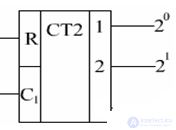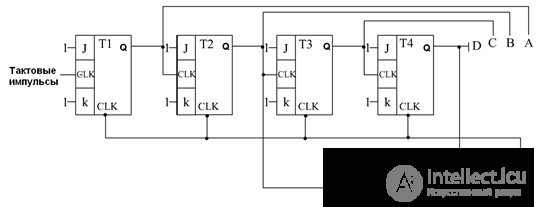Lecture
Digital counters
Pulse counter - a device designed to count the number of pulses applied to the input. The result of the account is recorded in binary code.
The digital circuit that performs the counting function can be assembled from triggers and logical elements.
Counters are based on JK or T-flip-flops.
Counter width is determined by the maximum number to which it counts in binary code
to assemble a counter modulo 16 you need 4 triggers
CT2 - two-digit binary counter

Outputs: 1, 2 - designation of binary digits
C1 - synchronization counting input
R - set to 0 (reset)
Counters apply:
• for counting numbers, impulses, time intervals,
• sequence ordering,
• for addressing,
• to build frequency dividers,
• to build memory elements.
Counters by module
The counter module shows how many different states the counter goes through during the full count cycle.
Example 1. For an account modulo 5, the cycle is a sequence of binary numbers: 000, 001, 010, 011,100 (i.e., 0,1,2,3,4).
Example 2. At the output of a 4-bit binary counter, 4 binary digits are initiated; such a counter counts from 0000 to 1111 (that is, from 0 to 15).
Asynchronous decimal counter. (Counter modulo ten)

It counts from 0000 to 1001 (from 0 to 9), i.e. you need 4 binary digits 8 4 2 1 therefore, the counter is implemented on four JK triggers and the NAND element. Triggers are in J = K = 1 switch mode. Clock pulses trigger only the first T1 trigger, T1 trigger triggers T2, and so on.
Such a trigger is called a sequential or through-carry counter.
Each higher digit switches 2 times less than the previous one. Logic element and HE - to set all the triggers to "0" with the arrival of the tenth pulse (1010), i.e. when applying a logical "1" to D and B on an AND-HE logical element, all triggers are reset, and the counter starts counting pulses again, and HE provides a reset.
Synchronous counters
To increase the speed of digital devices, it is necessary that the counters operate synchronously with the clock pulses. This task is implemented in synchronous counters.
Consider a 3-bit modulo 8 counter.

JK triggers operate in switching mode and in lock mode
Comments
To leave a comment
Electronics, Microelectronics, Element Base
Terms: Electronics, Microelectronics, Element Base